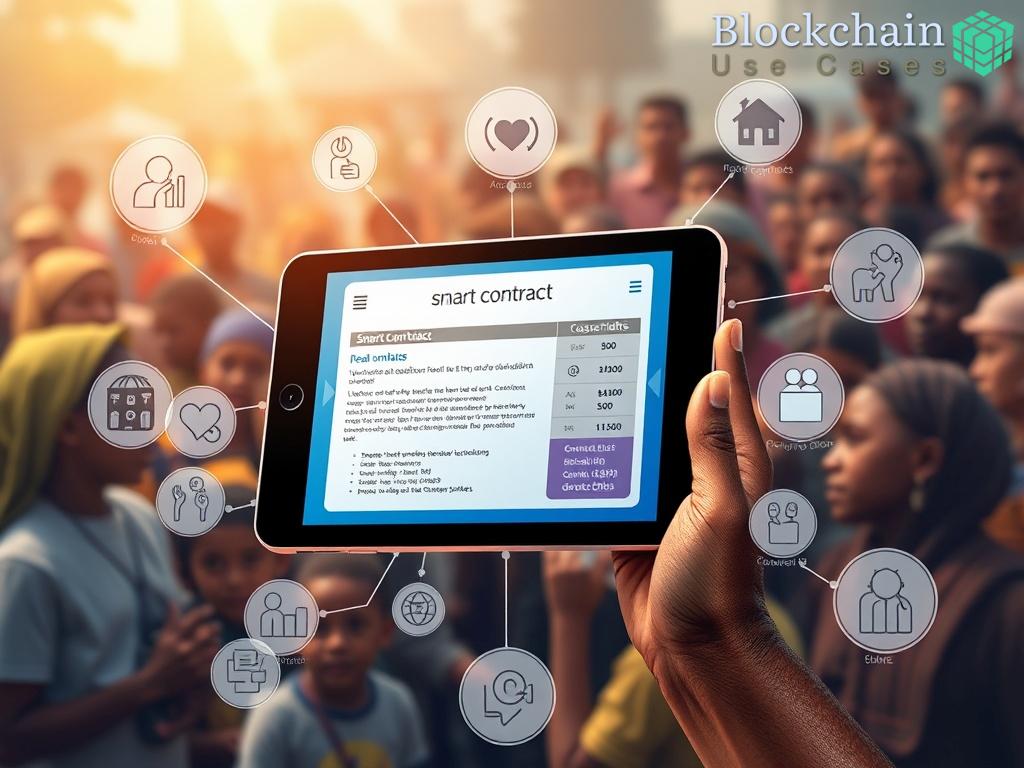Harnessing Blockchain for Dynamic Philanthropy

The landscape of philanthropy is undergoing a transformative change, driven by the revolutionary technology of blockchain. With the advent of smart contracts, organizations can now allocate donations dynamically, ensuring that funds are distributed based on real-time needs. This not only enhances transparency but also maximizes the impact of each contribution, allowing donors to feel more connected to the causes they support.
Imagine a world where your charitable contributions directly address the most pressing needs at any given moment. Blockchain technology makes this possible by enabling automated donation allocation through smart contracts. These self-executing contracts automatically release funds to specific projects or organizations based on predefined criteria, such as urgent humanitarian needs or ongoing crises. This mechanism ensures that donations are utilized where they are needed most, drastically improving efficiency in the charitable sector.
The traditional method of philanthropy often suffers from delays and inefficiencies in fund allocation, leaving many urgent needs unmet. With a blockchain-based approach, organizations can implement real-time needs assessments that feed directly into their donation strategies. By leveraging data analytics and community feedback, charities can adjust their priorities swiftly, allowing for a more responsive philanthropic model.
Below is a comparative overview of traditional philanthropy versus blockchain-based automated donation allocation:
| Aspect | Traditional Philanthropy | Blockchain-Based Philanthropy |
|---|---|---|
| Fund Allocation | Manual and often delayed | Automated and real-time |
| Transparency | Limited visibility | Full traceability |
| Donor Engagement | Often passive | Active involvement through real-time updates |
This comparison illustrates not only the potential for increased efficiency but also enhanced engagement and satisfaction for both donors and recipients. The shift towards dynamic philanthropy marks a significant leap forward in how charitable organizations operate.
Real-Time Need Assessment: A Game Changer
In a world where crises can emerge without warning, the ability to respond swiftly is crucial. Traditional philanthropic methods often lag behind the pressing needs of communities, but with the integration of smart contracts and blockchain technology, a paradigm shift is on the horizon. Real-time need assessment is no longer a distant dream; it is becoming a tangible reality that promises to reshape how donations are allocated, ensuring that help reaches those who need it most without unnecessary delays.
The advent of data analytics in the charitable sector has transformed the way organizations understand and respond to community needs. By employing advanced algorithms and machine learning, charities can now gather and analyze data from various sources, including social media, local reports, and real-time surveys.
This data-driven approach allows for a comprehensive evaluation of urgent needs and significantly enhances decision-making processes. Here’s how real-time data is leveraged:
- Continuous Monitoring: Organizations can track ongoing situations and changes in community needs, ensuring that they remain responsive.
- Community Engagement: Feedback mechanisms enable beneficiaries to voice their immediate needs, creating a participatory approach in resource allocation.
- Predictive Analytics: By analyzing historical data, charities can anticipate upcoming challenges, allowing them to prepare resources in advance.
At the core of this revolution lies the smart contract—an automated, self-executing agreement coded onto the blockchain. These contracts play a pivotal role in transforming philanthropic operations by ensuring that funds are allocated based on real-time assessments. Once predefined conditions are met, funds are instantly released to the designated projects.
This mechanism not only streamlines the allocation process but also enhances accountability, as every transaction is recorded on the blockchain, providing full transparency for donors.
| Feature | Traditional Method | Smart Contract Approach |
|---|---|---|
| Fund Release Timing | Delayed and manual | Instantaneous upon criteria fulfillment |
| Transaction Visibility | Limited reporting | Complete transparency on blockchain |
| Engagement Level | Reactive | Proactive with real-time updates |
The combination of real-time need assessment and smart contract technology is nothing short of revolutionary. It represents a shift towards a more agile and responsive philanthropic model, where every dollar donated can be directed to the most pressing needs effectively.
As this innovative approach continues to gain traction, it empowers not only the organizations but also the donors and recipients alike, fostering a sense of community and shared responsibility. The potential for enhanced impact and efficiency is limitless, paving the way for a future where philanthropy adapts dynamically to the needs of our world.
Automated Allocation: Efficiency Meets Compassion
The intersection of technology and philanthropy is creating a new era of charitable giving, where automation meets the urgency of human compassion. As the world grapples with various crises, the traditional methods of donation allocation often fall short, leaving many vulnerable individuals and communities in dire need. In this transformative landscape, smart contract-based automated donation allocation emerges as a beacon of hope, ensuring that support reaches those who require it most, precisely when they need it.
By leveraging blockchain technology, organizations can now execute donations with unprecedented efficiency. This approach eliminates the bureaucratic red tape typically associated with charitable contributions. Instead of waiting for manual processing, funds can be released automatically once predefined needs are met. Imagine a scenario where natural disasters strike, and within moments, the affected areas receive the vital support they require, all thanks to automated allocation systems. This seamless integration of technology enhances not only the speed of response but also the overall impact of donations.
Though efficiency is a cornerstone of automated allocation, the compassionate edge of this technology cannot be overlooked. The use of real-time data ensures that donations are not only rapid but also relevant. Organizations can continuously assess community needs through data analytics, ensuring that every dollar spent has a meaningful impact. When donors contribute, they can be assured that funds are directed towards immediate humanitarian crises, rather than getting lost in administrative processes.
This model fosters a profound connection between donors and recipients. By offering real-time updates on how contributions are being utilized, donors gain a sense of involvement in the journey of their charitable gifts. They become part of a dynamic ecosystem where their generosity translates directly into action, effectively bridging the gap between intention and impact. This creates a community of engaged philanthropists who are empowered to make informed decisions about their charitable efforts.
The future of philanthropy is being reshaped by the principles of trust and transparency, which are integral to the blockchain framework. Each transaction executed through smart contracts is meticulously recorded on a public ledger, allowing donors to track their contributions with clarity and assurance. This level of transparency is revolutionary, as it cultivates an environment of accountability within charitable organizations. When donors can see the direct impact of their contributions, it not only enhances their trust in the system but also encourages continued support for various causes.
As we move further into this new era, it becomes clear that automated allocation is not merely a trend but a foundational change in how we approach philanthropy. By embracing the capabilities of smart contracts, organizations can ensure that their resources are not just available but are actively making a difference, addressing the pressing needs of the moment. In this collaborative landscape, where technology and empathy converge, the potential for positive change is limitless.
Transparency in Donations: Trust Through Smart Contracts
In an era where transparency is paramount, smart contracts are emerging as a powerful tool in the philanthropic landscape. The integration of blockchain technology into donation allocation not only enhances accountability but also builds trust between donors and charitable organizations. As we delve deeper, we uncover how smart contracts are revolutionizing the way donations are managed and monitored, fostering a culture of transparency that benefits all stakeholders.
The essence of philanthropic giving is trust. Donors want assurance that their contributions are making a meaningful impact. Smart contracts provide this assurance through their immutable nature, where all transactions are recorded on a public ledger. This transparency enables donors to track exactly where their funds are allocated and how they are utilized. With every transaction permanently logged, the potential for mismanagement or fraud diminishes significantly.
To understand the transformative power of smart contracts in fostering transparency, consider the following mechanisms:
- Real-Time Tracking: Donors can monitor the flow of their contributions in real-time, gaining insights into how their funds are being deployed to address urgent needs.
- Detailed Reporting: Automated reporting features linked to smart contracts provide donors with regular updates on the impact of their contributions, enhancing their engagement and satisfaction.
- Pseudonymous Transactions: While maintaining donor privacy, blockchain technology allows for transparent tracking of funds, ensuring that every donation is accounted for without compromising individual identities.
| Aspect | Traditional Donation Process | Smart Contract Approach |
|---|---|---|
| Fund Allocation Visibility | Limited, often opaque | Comprehensive, real-time transparency |
| Accountability | Subject to human error | Immutable records on blockchain |
| Donor Engagement | Passive | Active, with real-time feedback |
As more organizations adopt smart contract technology, a new paradigm of trust is emerging in philanthropy. This shift not only empowers donors but also encourages charities to uphold high standards of transparency and accountability. When donors feel secure in their contributions, they are more likely to engage and give, leading to a sustainable cycle of support that benefits those in need. Embracing smart contracts is not just about efficiency; it’s about fostering a community built on the principles of trust, integrity, and shared responsibility.
Empowering Donors: Control and Impact Redefined
The landscape of philanthropy is evolving, and at the forefront of this transformation is the capability for donors to wield unprecedented control over their contributions. With the integration of smart contract-based automated donation allocation, the power dynamics between donors and charitable organizations are shifting. No longer are donors relegated to a passive role; they are now active participants in the philanthropic ecosystem. This empowerment not only enhances their giving experience but also amplifies the impact of their donations.
Redefining the Donor Experience
Imagine being able to direct your contributions to specific projects that resonate deeply with your values and concerns. Smart contracts empower donors by allowing them to specify criteria for fund allocation, ensuring that their contributions are utilized in ways that align with their intentions. This level of control fosters a sense of ownership, transforming the act of giving into a dynamic partnership between donors and recipients.
In this new model, donors can engage with charities in real-time, making informed decisions based on up-to-date needs assessments. This proactive approach not only keeps donors informed but also allows them to respond to emerging crises swiftly. For instance, if a natural disaster strikes, donors can choose to redirect their funds to relief efforts, ensuring that their support is timely and relevant.
The Amplified Impact of Informed Giving
With great power comes great responsibility, and this is particularly true in the philanthropic sector. Donors now have access to real-time data, enabling them to assess the effectiveness of their contributions. By leveraging analytics and feedback mechanisms, they can continuously monitor the impact of their donations, establishing a direct line of sight to the outcomes their generosity creates.
To illustrate the multifaceted benefits of this empowered donor experience, consider the following:
- Enhanced Decision-Making: Donors can make informed choices based on real-time data, ensuring their contributions address urgent needs effectively.
- Increased Engagement: Regular updates and transparent reporting foster a sense of involvement, allowing donors to feel connected to the causes they support.
- Community Building: By collaborating with charities and other donors, individuals can create a network of support, amplifying their impact through collective efforts.
This newfound agency not only enriches the donor experience but also cultivates a culture of accountability within charitable organizations. When donors are informed and actively engaged, they can hold organizations accountable for their impact, fostering a commitment to transparency and ethical practices.
Forging a Path Towards Sustainable Philanthropy
As the philanthropic landscape continues to adapt, the rise of smart contract-based donation allocation heralds a new era of giving where control and impact are redefined. Donors are no longer just contributors; they are integral to shaping the future of philanthropy. By embracing this empowered role, individuals can ensure that their generosity translates into meaningful change, creating a sustainable cycle of support for communities in need.





